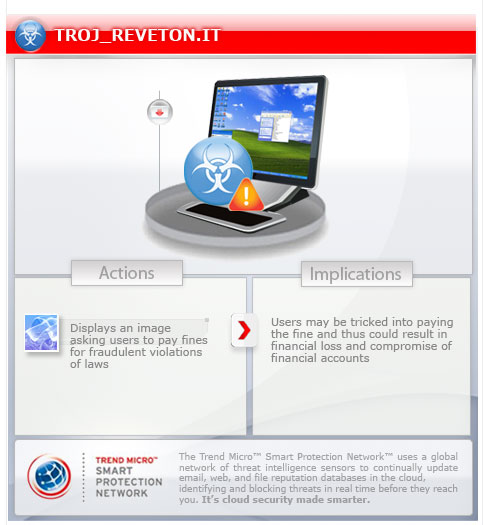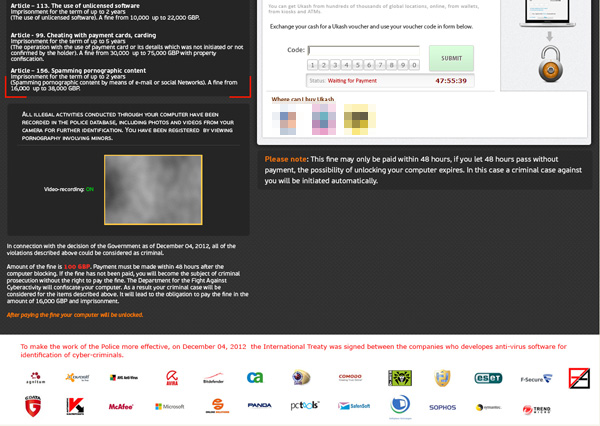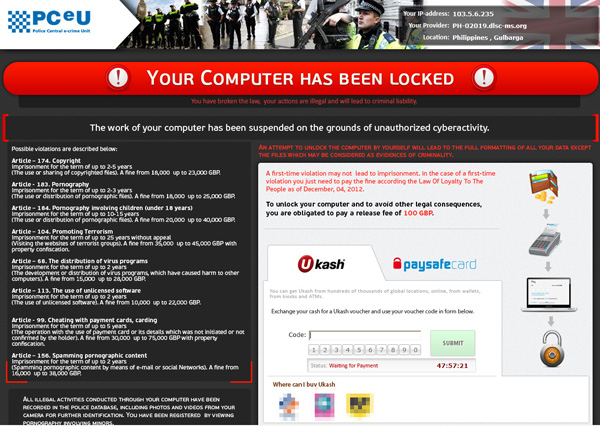TROJ_REVETON.IT
Trojan.Ransomlock.G (Symantec), Troj/Ransom-LX (Sophos), Trojan-Ransom.Win32.Foreign (Ikarus),
Windows 2000, Windows XP (32-bit and 64-bit), Windows Server 2003, Windows Vista (32-bit and 64-bit), Windows 7 (32-bit and 64-bit)


Threat Type: Trojan
Destructiveness: No
Encrypted: Yes
In the wild: Yes
OVERVIEW
This police ransomware locks the infected system and urges users to pay by displaying a so-called treaty of antivirus software companies.
To get a one-glance comprehensive view of the behavior of this Trojan, refer to the Threat Diagram shown below.

For the related story, you may read the blog post New Police Ransomware Claims Fake Treaty Among AV Vendors and Police
This Trojan arrives on a system as a file dropped by other malware or as a file downloaded unknowingly by users when visiting malicious sites.
It connects to a website to send and receive information.
TECHNICAL DETAILS
Arrival Details
This Trojan arrives on a system as a file dropped by other malware or as a file downloaded unknowingly by users when visiting malicious sites.
Installation
This Trojan injects itself into the following processes as part of its memory residency routine:
- IEXPLORE.EXE
- IESTART.EXE
- FIREFOX.EXE
- OPERA.EXE
- CHROME.EXE
Autostart Technique
This Trojan drops the following file(s) in the Windows User Startup folder to enable its automatic execution at every system startup:
- %User Startup%\runctf.lnk
(Note: %User Startup% is the current user's Startup folder, which is usually C:\Windows\Profiles\{user name}\Start Menu\Programs\Startup on Windows 98 and ME, C:\WINNT\Profiles\{user name}\Start Menu\Programs\Startup on Windows NT, and C:\Documents and Settings\{User name}\Start Menu\Programs\Startup.)
Other System Modifications
This Trojan adds the following registry entries:
HKEY_CURRENT_USER\Software\Microsoft\
Windows\CurrentVersion\Internet Settings\
Zones\0
2500 = "3"
HKEY_CURRENT_USER\Software\Microsoft\
Windows\CurrentVersion\Internet Settings\
Zones\1
2500 = "3"
HKEY_CURRENT_USER\Software\Microsoft\
Windows\CurrentVersion\Internet Settings\
Zones\2
2500 = "3"
HKEY_CURRENT_USER\Software\Microsoft\
Windows\CurrentVersion\Internet Settings\
Zones\3
2500 = "3"
HKEY_CURRENT_USER\Software\Microsoft\
Windows\CurrentVersion\Internet Settings\
Zones\4
2500 = "3"
HKEY_CURRENT_USER\Software\Microsoft\
Internet Explorer\Main
NoProtectedModeBanner = "1"
HKEY_CURRENT_USER\Software\Microsoft\
Internet Explorer\Main
NoProtectedModeBanner = "1"
It modifies the following registry entries:
HKEY_CURRENT_USER\Software\Microsoft\
Windows\CurrentVersion\Internet Settings\
Zones\0
1609 = "0"
(Note: The default value data of the said registry entry is 1.)
HKEY_CURRENT_USER\Software\Microsoft\
Windows\CurrentVersion\Internet Settings\
Zones\1
1609 = "0"
(Note: The default value data of the said registry entry is 1.)
HKEY_CURRENT_USER\Software\Microsoft\
Windows\CurrentVersion\Internet Settings\
Zones\2
1609 = "0"
(Note: The default value data of the said registry entry is 1.)
HKEY_CURRENT_USER\Software\Microsoft\
Windows\CurrentVersion\Internet Settings\
Zones\3
1609 = "0"
(Note: The default value data of the said registry entry is 1.)
HKEY_CURRENT_USER\Software\Microsoft\
Windows\CurrentVersion\Internet Settings\
Zones\4
1609 = "0"
(Note: The default value data of the said registry entry is 1.)
Backdoor Routine
This Trojan connects to the following websites to send and receive information:
- {BLOCKED}6.{BLOCKED}5.255.219:443
NOTES:
It downloads an encrypted file and save it to the infected system as:
- %System Root%\Documents And Settings\All Users\Application Data\{reversed malware filename}.pad
This encrypted file contains a DLL file when decrypted. The contents of the encrypted file may vary depending on the remote server.
The DLL file contains a lock screen image which contains images of various anti-virus companies saying that they signed a treaty to identify cyber-criminals.

Once the malware is executed, it locks the user's system and displays the following screen where a fake FBI message is displayed.

To unlock the system, the user is forced to pay 100 GBP via Ukash or Paysafecard.
SOLUTION
Step 1
Before doing any scans, Windows XP, Windows Vista, and Windows 7 users must disable System Restore to allow full scanning of their computers.
Step 2
Scan your computer with your Trend Micro product and note files detected as TROJ_REVETON.IT
Step 3
Restart in Safe Mode
Step 4
Delete this registry value
Important: Editing the Windows Registry incorrectly can lead to irreversible system malfunction. Please do this step only if you know how or you can ask assistance from your system administrator. Else, check this Microsoft article first before modifying your computer's registry.
- In HKEY_CURRENT_USER\Software\Microsoft\Internet Explorer\Main
- NoProtectedModeBanner = "1"
- NoProtectedModeBanner = "1"
- In HKEY_CURRENT_USER\Software\Microsoft\Windows\CurrentVersion\Internet Settings\Zones\0
- 2500 = "3"
- 2500 = "3"
- In HKEY_CURRENT_USER\Software\Microsoft\Windows\CurrentVersion\Internet Settings\Zones\1
- 2500 = "3"
- 2500 = "3"
- In HKEY_CURRENT_USER\Software\Microsoft\Windows\CurrentVersion\Internet Settings\Zones\2
- 2500 = "3"
- 2500 = "3"
- In HKEY_CURRENT_USER\Software\Microsoft\Windows\CurrentVersion\Internet Settings\Zones\3
- 2500 = "3"
- 2500 = "3"
- In HKEY_CURRENT_USER\Software\Microsoft\Windows\CurrentVersion\Internet Settings\Zones\4
- 2500 = "3"
- 2500 = "3"
Step 5
Restore this modified registry value
Important: Editing the Windows Registry incorrectly can lead to irreversible system malfunction. Please do this step only if you know how or you can ask assistance from your system administrator. Else, check this Microsoft article first before modifying your computer's registry.
- In HKEY_CURRENT_USER\Software\Microsoft\Windows\CurrentVersion\Internet Settings\Zones\0
- From: 1609 = "0"
To: 1609 = "1"
- From: 1609 = "0"
- In HKEY_CURRENT_USER\Software\Microsoft\Windows\CurrentVersion\Internet Settings\Zones\1
- From: 1609 = "0"
To: 1609 = "1"
- From: 1609 = "0"
- In HKEY_CURRENT_USER\Software\Microsoft\Windows\CurrentVersion\Internet Settings\Zones\2
- From: 1609 = "0"
To: 1609 = "1"
- From: 1609 = "0"
- In HKEY_CURRENT_USER\Software\Microsoft\Windows\CurrentVersion\Internet Settings\Zones\3
- From: 1609 = "0"
To: 1609 = "1"
- From: 1609 = "0"
- In HKEY_CURRENT_USER\Software\Microsoft\Windows\CurrentVersion\Internet Settings\Zones\4
- From: 1609 = "0"
To: 1609 = "1"
- From: 1609 = "0"
Step 6
Search and delete these files
- %System Root%\Documents And Settings\All Users\Application Data\{reversed malware filename}.pad
- %User Startup%\runctf.lnk
Step 7
Restart in normal mode and scan your computer with your Trend Micro product for files detected as TROJ_REVETON.IT. If the detected files have already been cleaned, deleted, or quarantined by your Trend Micro product, no further step is required. You may opt to simply delete the quarantined files. Please check this Knowledge Base page for more information.
Did this description help? Tell us how we did.

